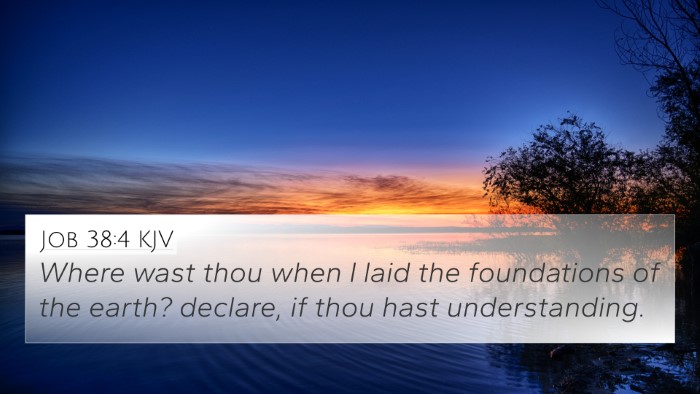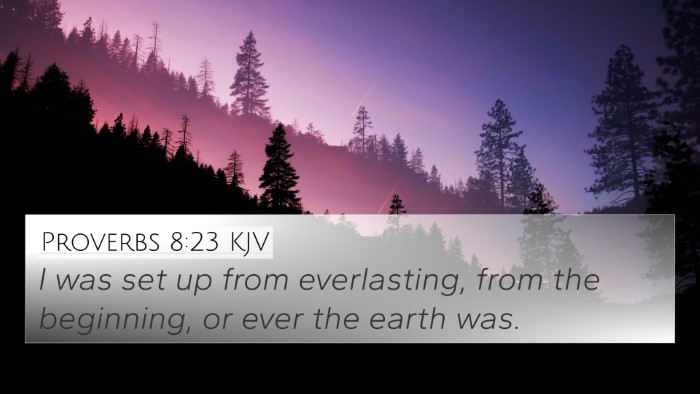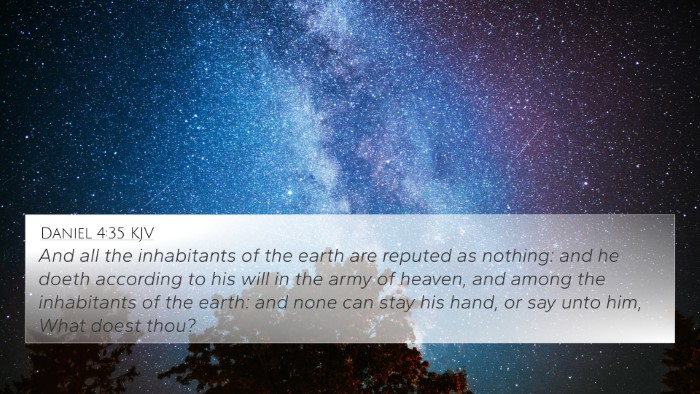Understanding Job 34:13
Job 34:13 (KJV): "Who hath given him a charge over the earth? or who hath disposed the whole world?"
Summary of Job 34:13
In this verse, Job's friend Elihu is emphasizing God’s sovereign authority and management over creation. He questions whether anyone has the authority to dictate God’s actions or to challenge His dominion over the earth. This highlights a key theme: the majesty and omnipotence of God in the governance of the universe.
Commentary Insights
Matthew Henry's Commentary
According to Matthew Henry, Elihu’s rhetorical questions serve to remind Job and his friends of their limited understanding of God’s ways. He underscores that only God has ultimate authority over creation, which is integral to understanding human suffering and divine justice.
Albert Barnes' Commentary
Albert Barnes notes that this verse captures the essence of God’s sovereignty. By asserting that God inherently possesses governance over the earth, Barnes emphasizes the impossibility of human beings claiming any authority in the face of divine power. He articulates that God’s control is absolute and that our comprehension of His purposes is limited.
Adam Clarke's Commentary
Adam Clarke reinforces the idea that God’s authority extends over the entire universe. He emphasizes that the questions posed are not only rhetorical but intended to provoke thought regarding the relationship between humanity and divine authority. Clarke encourages readers to reflect on the omnipresence and omnipotence of God, drawing connections to themes of humility and reverence in the presence of God.
Cross-References for Job 34:13
This verse can be understood in the context of several other scriptures that also address themes of divine authority and human limitation:
- Psalm 115:3: "But our God is in the heavens: he hath done whatsoever he hath pleased."
- Isaiah 40:12: "Who hath measured the waters in the hollow of his hand, and meted out heaven with the span, and comprehended the dust of the earth in a measure, and weighed the mountains in scales, and the hills in a balance?"
- Proverbs 16:9: "A man's heart deviseth his way: but the LORD directeth his steps."
- Romans 9:20-21: "Nay but, O man, who art thou that repliest against God? Shall the thing formed say to him that formed it, Why hast thou made me thus?"
- Jeremiah 10:23: "O LORD, I know that the way of man is not in himself: it is not in man that walketh to direct his steps."
- Isaiah 46:10: "Declaring the end from the beginning, and from ancient times the things that are not yet done, saying, My counsel shall stand, and I will do all my pleasure."
- Colossians 1:17: "And he is before all things, and by him all things consist."
- Revelation 4:11: "Thou art worthy, O Lord, to receive glory and honour and power: for thou hast created all things, and for thy pleasure they are and were created."
- Job 38:4: "Where wast thou when I laid the foundations of the earth? declare, if thou hast understanding."
- Psalm 24:1: "The earth is the LORD's, and the fullness thereof; the world, and they that dwell therein."
Thematic Connections
Job 34:13 serves as a vital piece in a larger framework of understanding God's control over both the earth and the moral order. The following themes can be explored:
- Sovereignty of God: Emphasizes God's absolute rule over creation.
- Human Limitation: Encourages humility in the face of divine authority.
- The Problem of Suffering: Connects with Job's broader narrative of questioning God's justice.
- Divine Wisdom: Highlights God's omniscience in governing the universe.
Application and Reflection
Readers are encouraged to reflect on how this passage reveals God's nature and their own relationship with Him. How do we recognize God's authority in our lives? How should this understanding shape our responses to suffering and injustice? By contemplating these questions, believers can deepen their faith and reliance on God's ultimate wisdom.
Conclusion
Job 34:13 invites us to appreciate the majesty of God and reminds us of our place in the grand narrative of creation. It serves as a powerful prompt to engage in comparative Bible verse analysis and enhances our understanding of the linkages within Scripture. Employing cross-referencing tools and techniques can enrich Bible study and facilitate a greater understanding of divine truths.










